Last Updated on October 11, 2025 by Lexi Kisses
Body Safe Sex Toys are non-toxic, non-porous and able to be sanitized. Materials such as Silicone, Stainless Steel & Glass are the most common.
There are no rules or regulations for the term “body-safe” in the world of sex toys. This means a company can simply say something is body-safe because they assume it is or want it to be.
This doesn’t mean all body-safe claims are bogus, though. Sometimes brands do care about sexual health and safety. And these brands usually prioritize transparency with their customers.
How do you know who to trust?
Shop at retailers who list their materials clearly and seem to know what they are talking about.
Don’t buy from sex shops that
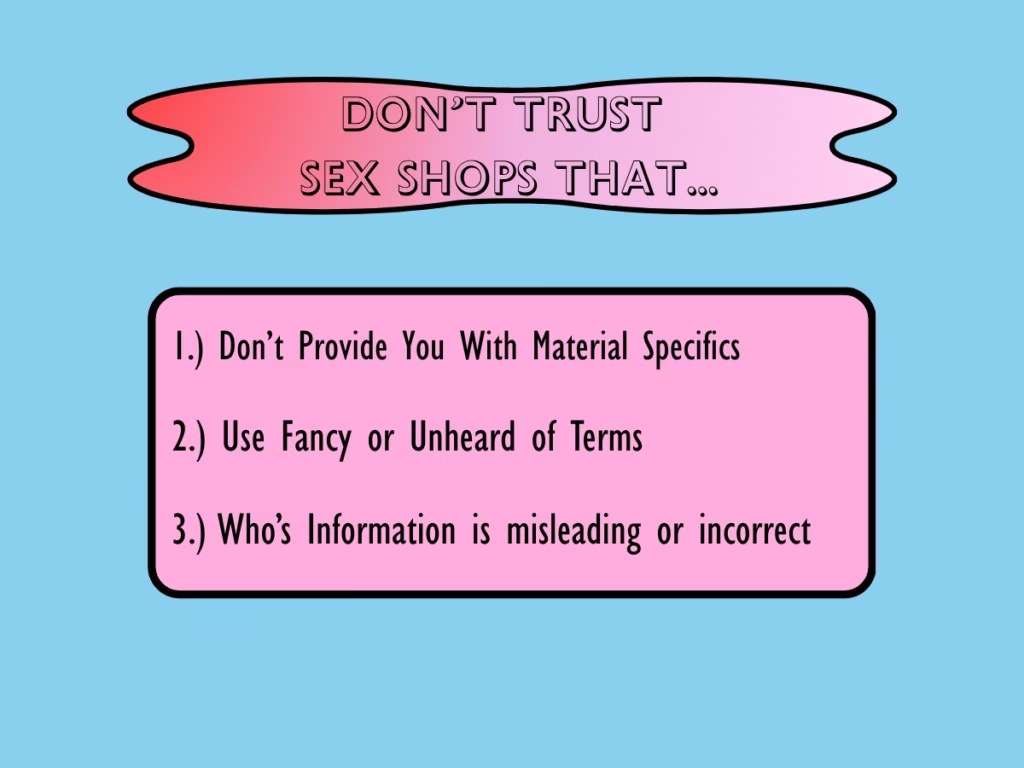
Do Not Provide You With Material Specifics
A major red flag for me is a shop not listing the material or being vague about it (especially when it’s a big box brand).
For instance, the description for this pipedream dildo just says, “incredibly pure, translucent material.”1 What?? That tells you nothing about the material! And then, when you go to expand the specifics, it’s just blank. The specifics are no longer blank and have been updated to state that it is, in fact, TPE.
Spoiler alert, this type of product and description usually just means it’s a type of thermoplastic (TPE). Which, according to my definition, is not body safe because it can not be completely sanitized.
A few other meaningless labels I saw were hard plastic2 and soft plastic.3 If it doesn’t at least say ABS plastic, it’s a no go on safety for me.
Use Fancy or Unheard of Terms
If the company is using a fancy term or unheard of name to describe the material, I wouldn’t trust it.
Pipedream’s High Quality Elite Silicone™4 material seems to just be TPE when consumers have bought it.
A customer who bought one of their products claiming to be this elite silicone received the box, and it said TPR. 5 New boxes however did not. Which means they either changed the material, or are lying (YIKES).
Dangerous lilly was in the chat & did a flame test to see if it was real silicone. It failed. So, buyers beware.
Doc Johnson’s ULTRASKYN 6 material is another prime example of these misleading fancy words. When in reality it seems to just be a TPE blend 7 under a new name. With consumers reporting long term use issues with the material8 as well as “melting”9 over time.
Who’s Information is misleading or incorrect.
Sometimes shops will downplay the risks of certain materials, or seemingly leave information out to make them seem safer. Major red flag!
Calexotics 10 and PinkCherry 11 body describe a TPR dildo as body safe. Which they are not. TPR is not considered safe for insertables.
Calexotics even tacks on “ensuring a worry-free and enjoyable experience” to try to add extra comfort for the buyer.
You know what would really be worry free? Using a body safe material.
If the product page of the item doesn’t say much, I recommend looking at the company’s blog (many have them today) and seeing what they say about sex toy materials.
Love Honey is a good example of a misleading/misinformed company guide on materials.
Here are a few examples from their Beginner’s Guide to Sex Toy Materials 12:
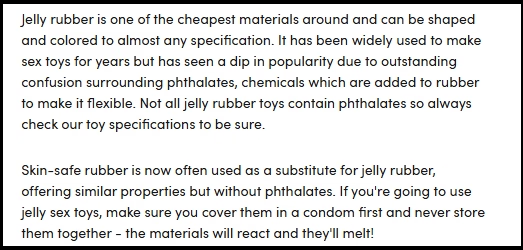
This is their section on Jelly toys.
My first issue with it is the use of the word Jelly. Jelly is just a “fancy” word shops use when they don’t want to list questionable materials such as TPE or PVC.
There’s also no mention of the porous nature of jelly toys, or the fact that they may leach toxic phthalates.
And, the “cover it with a condom” advice, I no longer recommend because jelly rubber is usually PVC/TPE and PVC material isn’t compatible with regular latex condoms as it breaks them down. 13 Meaning there’s no way to know a condom can protect you.
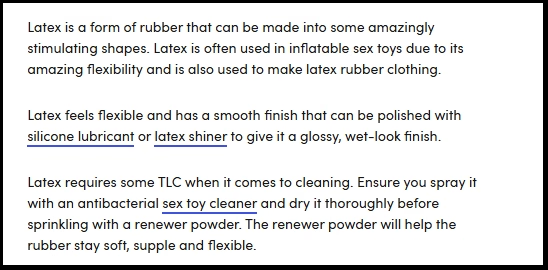
Latex is another, porous material. Spraying it with a toy cleaner, may or may not work because the issue with porous materials is you can’t clean every pore no matter what you do.
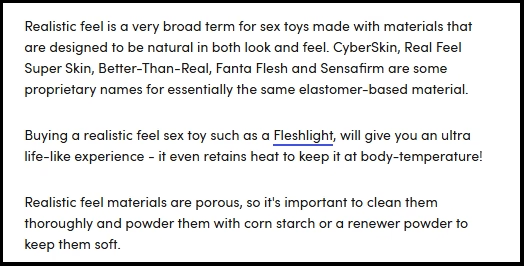
So, there’s that Cyberskin term again, that is basically the same issue as jelly. It’s being used to cover up a potentially harmful material.
I at least appreciate that they mention the material is porous this time. But, why only on the Realistic Feel section when two other porous materials were stated?
As we can see, even if a company carries “body safe” sex toys, it’s hard to believe they care about safety when they don’t list the materials for toys that are clearly porous or toxic. Or even worse, use words like “Jelly” or “Cyberskin” to try to make you feel more comfortable using a hazardous toy.
Do Buy from Sex Shops that
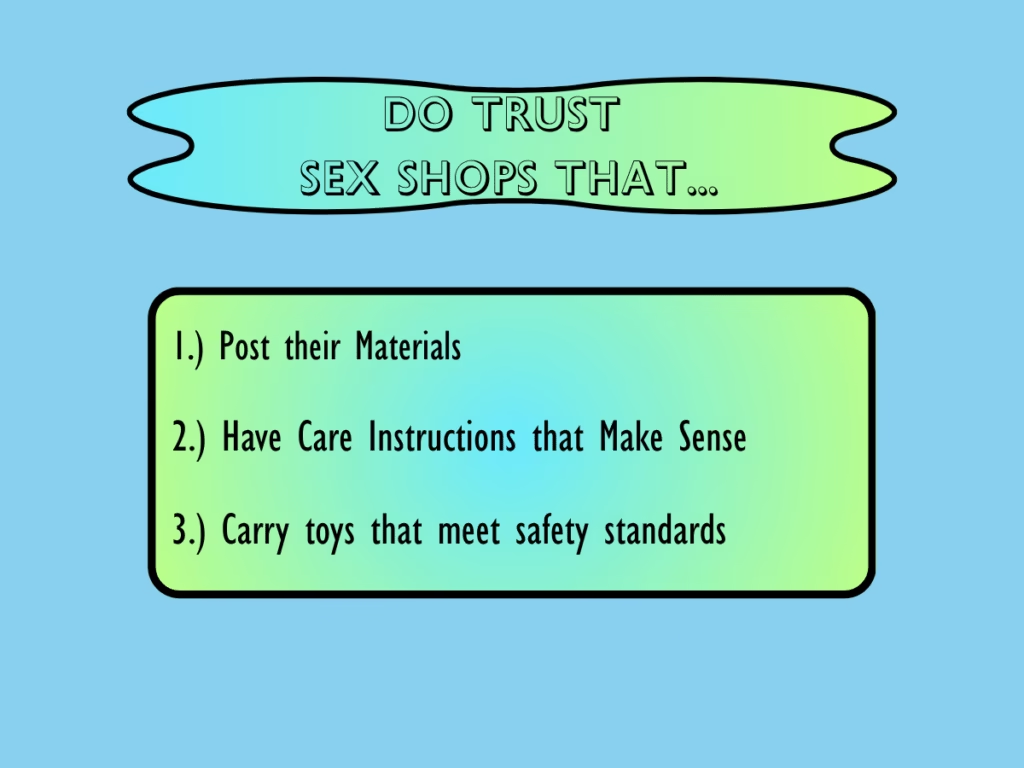
Post their Materials
At the very least, you want the shop to list real materials that you can research. If you look up a material, and the only one coming up for information is the manufacturer, that’s usually a red flag.
Silicone glass and metal are common body-safe materials. And, all these materials have scientific data on them that we can use to determine how safe they are. Things like cyberskin, or clear plastic do not.
A lot of indie shops take specifics to the next level by even posting the softness grades of their silicones. This not only makes it easier for us to buy as the consumers, but it shows they know what goes into their products.
Something that is nice to have but by no means a requirement are lab tests. But, those are expensive and most of the companies that produce anything worth fucking are inde. So, they don’t usually have the finances to run these fancy tests.
Now that poses the question, why aren’t big box brands showing lab results? Most of the time it’s because they care more about keeping money in their pockets than they do the consumers’ health.
Have Care Instructions that Make Sense
The care instructions should make sense for the toy’s material.
If the material is silicone, steel or glass, you want the cleaning instructions to include something like “boiling to sanitize” unless it’s electric, or the company states why.
If it doesn’t include this when care instructions are provided; the material may not be what they claim it is.
Lube recommendations can also give you an idea of the toy’s legitimacy. For instance most silicone makers will state “use water-based lube only” or “works best with water-based lubes” because they understand other lubes may break down the material.
Carry toys that meet safety standards
Just because a sex toy is being sold doesn’t mean it’s body-safe.
Right now, one of the more popular styles of jeweled anal plugs 14 is unsafe.15 The toy’s base does not have an adequate flare to prevent it from getting sucked inside your body during arousal.
A proper base should be significantly wider than the widest part of the toy. And, if you don’t want to worry about that, T-shape bases are the safest options.
If a butt plug maker or retailer has these types of issues with their products, it’s important to note that they might not know the risks of their other products.
Which means, proceed with caution or go somewhere else.
Last bit of Sex Shop Advice
Worry more about the manufacturer than the retailer. Retailers can carry toys from a variety of different brands, some safe, some unsafe.
The manufacturer on the other hand is the one who makes the toy. They should be trustworthy. If they try to mislead you, don’t trust any of their claims.
Body-Safe Materials
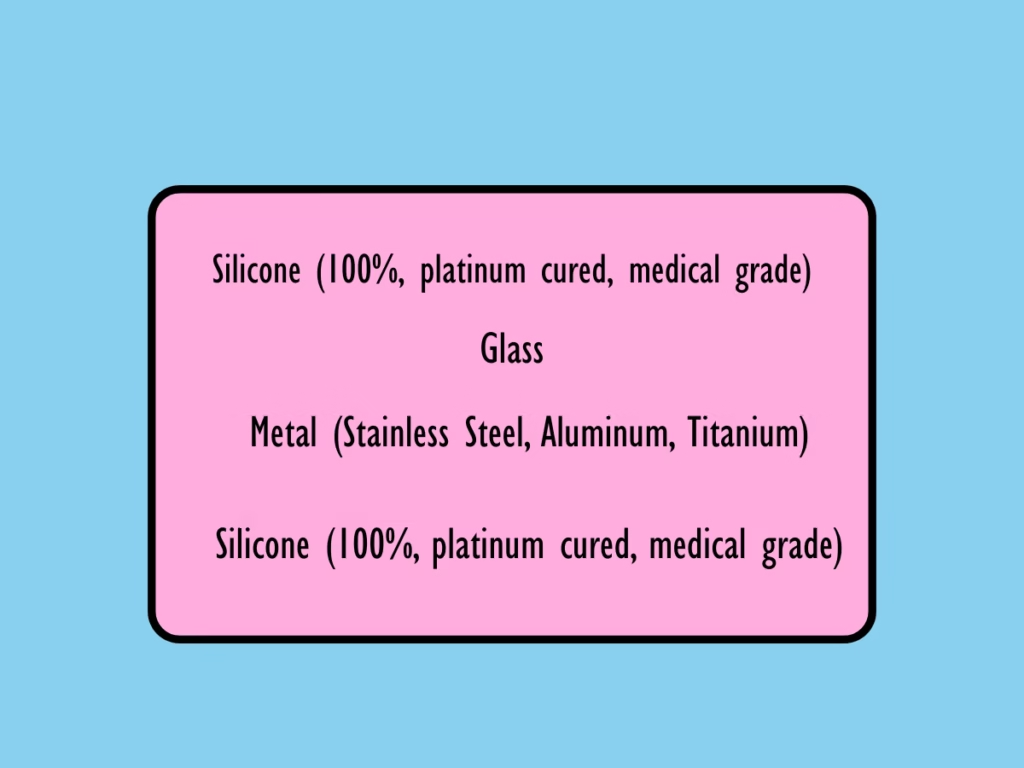
Body safe sex toy materials are those that are non-porous, non-toxic, and sanitizable.
Silicone (100%, platinum cured, medical grade)
- Softest Body Safe Material
- Retains temperatures (Hot & Cold)
- Lightweight
- Flexible
Silicone is the softest body safe material out there. It’s light weight, flexible and, for those looking to play with temperatures, it retains both hot & cold well.
Many researchers generally consider it safe for use. With most types of silicone showing no toxic effects during lab testing.16 And, those that did show toxic effects, were not observed in consumer goods such as breast implants.
Silicone is also non-porous17 which makes it easy to sanitize.
When considering a safe silicone toy, look for terms like
- 100% Silicone
- Platinum/Platinum cured
- Medical Grade
This can help you avoid things like blends, or potentially other unsafe types of silicone; which may be porous or contain toxic additives.
It’s important to note that softer silicones such as 0030 can have a sticky texture. This is normal and does not necessarily mean the toy is TPE, as some fear.
When in doubt, try the flame test 18 and sink test.19
Glass
- Dense
- Weighty
- Rigid (inflexible)
- Retains temperatures
Glass sex toys are dense, rigid and weighty. They retain temperatures well, but be careful not to shock them, as this can cause them to break. When warming or cooling a glass toy, start at a neutral temperature before transitioning from hot or cold.
Glass is non-toxic and non-porous making it a safe option for all types of sex toys.20
When considering a safe glass toy, look for material names such as:
- Ceramic Glass
- Borosilicate glass
Look for
- Annealed21 or Tempered glass (these processes strengthen it)
Avoid Glass Sex toys that
- Use Paints
- Don’t list the type of glass
- Has thin sections (they break easily at these points) 22
- Are too Cheap (high quality glass toys are more than $20)
Inspect the glass when it arrives, and before each use. If it forms chips in it, discontinue use. The life-span of the toy will depend on the quality of the glass, how well it handles stress and how well it’s taken care of.
Glass sex toys are unlikely to shatter, even cheap ones, but they can chip or break off into chunks from hard impact (e.g a fall).
For clear and light colored toys, you can try using a polarizing lens test 22 to gauge how susceptible to breaking it is.
Metal (Stainless Steel, Aluminum, Titanium)
- Dense
- Heaviest Body Safe Material
- Weighty
- Rigid (inflexible)
- Retains temperatures
- Metal is a non-toxic, non porous material.
Metal is one of the heaviest body safe materials. It’s weighty, inflexible and retains temperatures immaculately.
When buying a metal sex toy, it’s important to remember that only certain metals are safe, due to their non-toxic, non-porous nature.
When Buying a metal sex toy look for
- 316 or 316L, 304* Stainless Steel
- *304 contains nickel if you’re allergic.
- Aluminum
- Titanium
And, If it just says “metal” don’t buy it. It could be any type of metal, a few of which are toxic.
Avoid Metals Such as
- Lead
- Chrome (chrome plated)
- Chromium
- Tin
- Zinc Alloy 23
There’s not many ways to check if your metal sex toy is what it claims to be, but we do know body safe sex toys aren’t magnetic. Which means, if they are, theirs a high chance of it being an unsafe metal.
So, maybe try holding a magnet to it. 24
Warning
All the materials above mention that they retain temperatures well. Remember to be careful when heating or cooling toys as they can burn or cause frostbite if done incorrectly.
For safety, start with a bowl of warm or cold water and soak the toy. I wouldn’t recommend trying things like the microwave or freezer unless prior research has been done to ensure safety.
Possibly Body Safe
The materials in this category have not shown any negative effects to users, but do not have enough information on them for me to say they are absolutely safe or unsafe.
Wood
A wood sex toy with a proper finish will be smooth to the touch. This eliminates the possibility of things like splinters, rough textures and bacteria build up. Wood is naturally porous 25 so a coating is crucial to making it body safe.
When looking for a wood sex toy, look into the type of sealant they use. If it’s used in the medical field, I consider it safe.
Many medical instruments use specific types of epoxy resin, even inside the body, so if a manufacturer lists any of those, I would trust it.26 Epoxy has also been found to be non-toxic once cured.27
In general, Avoid
- Wood Stains
- Natural Finish/Unfinished Woods
- Unlisted Sealants
- Oil Sealants
Note: Wood toys can arrive with an improper seal and over time the sealant can degrade. 28 This means it’s important to perform a water test 29 when it arrives, and if/when you begin to see signs of degradation.
Proceed With Caution
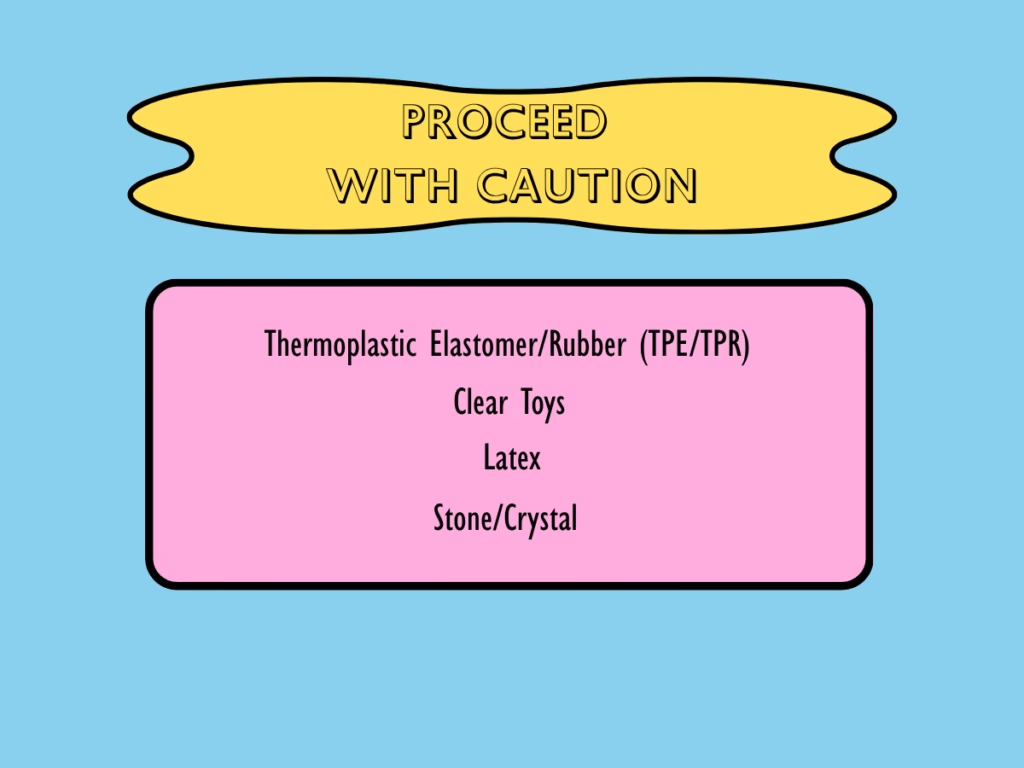
Materials in this category are porous. This makes them safe to use the first time, but overtime they collect more and more bacteria, increasing their riskiness. These materials can not be fully cleaned.
If you notice any issues with your genitals, such as rashes or yeast infections, after prolonged use of a toy made from these materials, it might be time to find a replacement.
Thermoplastic Elastomer/Rubber (TPE/TPR)
The porous nature of thermoplastic may make it more of an issue for insertables than strokers. This is because insertables are coming in direct contact with the mucus membranes of your body, as opposed to strokers, which are only coming in contact with the superficial layer of your skin.
This doesn’t mean they are 100% safe to use externally though. Even superficially, there is a chance of built up bacteria coming into contact with the opening of the urethra; causing a UTI or other infections.
Even a properly cleaned toy can have these risks.
A study from 2014 found that TPE sex toys that came in contact with HPV still contained traces of the infection 24 hours after cleaning.30
The rule of thumb for this material is; if it’s not going inside you or being shared, it’s generally considered safe for short term use.
Clear toys
Unless it’s a glass toy, don’t trust the claims of a body safe “crystal” clear toy that says silicone. They are often just something else in disguise.
“Clear” silicone has a milky cloudy look to it; it’s often called “near clear”. If it’s crystal clear, there’s a good chance it’s an unsafe material such as PVC/TPR or Jelly.31
Other Examples of Clear Silicone:
- Something Squishy Toys: Near Clear Permanent Marker
- Erotic Effect: Sleek-G Silicone Dildo
- Paladin Pleasure Sculptors: U2THG16 Cirrus Small NC 0031 UV GITD CS
Latex
Latex sex toys have a similar issue as TPE, their porous nature causes them to collect bacteria over time.32
Stone/Crystal
I’m not sure what advice to offer when it comes to stone dildos because information on them is scarce. Personally though, I will say they are not body safe.**
The polish they use on them can leave behind chemical residue that exposes you to toxic substances.33 And even if it’s polished without chemicals, the stone itself can have imperfections that harbor bacteria.
**These are in the proceed with caution section due to a lack of solid sources.
Not Body-Safe
The materials in this category can harbor bacteria and/or expose you to toxic substances.
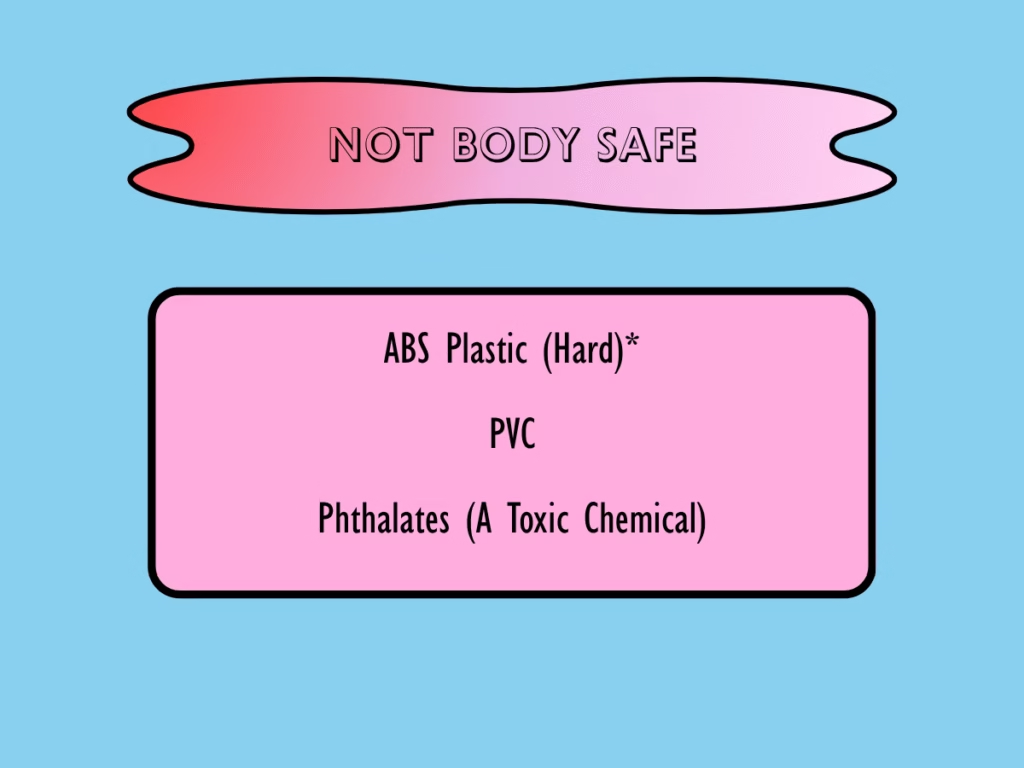
ABS Plastic (Hard)
A study from 2020 testing 20 sex toys found that the ABS plastic toys had the highest cytotoxicity of any of the samples, meaning they were toxic to cells. 34
That same study also found that the antimicrobial compounds (triclosan) that are added to ABS plastic to make it anti-bacterial have the potential to interfere with the body’s natural hormones.
This leads me to believe that ABS plastic may not be as safe as we once thought.
There’s also the concern about the potential of exposing the user to microplastics.35 Overtime, sunlight36 and use will degrade the toy. And, with this degradation it can introduce microplastics into your body and environment.
Not much is known about the effects of microplastics. Professionals express concerns that they could have adverse effects on the immune system, nervous system, and reproductive system, along with many other parts of our body.37
I’m not sure what advice to give besides It might be fine.
Might be because there’s a chance it could be cytotoxic (toxic to cells) which would make it a huge no for me.
Assuming it isn’t toxic. I’d say it’s safe if it’s used for the handle or casing. But, keep it away from any open orifices and watch out for scratches, and tears in the plastic.
PVC
Here’s the thing about PVC. Even if it’s phthalate free, it’s probably leaking toxic chemicals.
The reason this is the case is in order to make PVC useful, you need to add plasticizers.38 39 And, over time these plasticizers leach out of the material; exposing you to their toxicity.40
PVC as a whole has also been criticized for its use as flooring, pipes and doors, due to the toxic chemicals it may secrete.
Known Toxic Chemicals to Look Out For
Phthalates
Phthalates are chemicals they add to plastic to make it more flexible.
These chemicals are known to cause heart, liver and kidney damage to rats during lab tests. As well as increasing their risks of developing cardiovascular, liver, urologic, endocrine, and genital diseases. 41
These tests and ones similar are why phthalates are so negatively regarded. Common materials that contain phthalates are:
- Jelly
- Rubber
- PVC
So, if you are going to try these risky materials. Don’t buy them unless they say phthalate-free
It is worth noting companies in the past have been caught lying about the phthalate free claims. Dildology42 did some tests on Doc Johnson’s phthalate free James Deen dildo. And, it failed.43
With that being said, my advice is to try out a safer material.
Last Tip, Check the Box
I know it sounds crazy, but sometimes checking the materials on the box when the toy arrives will let you know if the company is lying.
Sometimes the company forgets to change the box, or just doesn’t care to put the effort in and then their packaging calls them out.
This happened with a redditor who bought a LoveHoney toy that listed itself as “plastic” only to show up and list PVC on the box.44 So, when in doubt, check the box. They could have forgotten to cover up their lie.
Final Thoughts
Stick with companies that are transparent about their materials. If you find a toy that works, and it passes all the items on the check list I’d say trust it.
If you have a problem with a sex toy after long term use, throw it out. Don’t let a misinformed or mismanaged company tell you otherwise.
When a company doesn’t list all the information you need to make an informed purchase it’s worth moving on. It doesn’t mean they aren’t safe, but it does show a lack of understanding about the product. Which could result in body safe misinformation.
- Pipedream. “King Cock Clear 6″ Cock with Balls.” Pipedream® Products, 2025, pipedreamproducts.com/collections/dildos/products/king-cock-clear-6-cock-with-balls. Accessed 23 Aug. 2025.[↩]
- LoveHoney. “CB-6000S Short Male Chastity Cage Kit.” Lovehoney US, 2017, www.lovehoney.com/bondage/chastity-devices/cock-cages-plugs/p/cb-6000s-short-male-chastity-cage-kit/a16931g20506.html. Accessed 26 Sept. 2025.[↩]
- LoveHoney. “Lifelike Lover Classic Realistic Dildo 6 Inch” Lovehoney US, https://www.lovehoney.com/sex-toys/dildos/realistic-dildos/p/lifelike-lover-classic-realistic-dildo-6-inch-/a22814g81744.html. Accessed 23 Aug. 2025.[↩]
- King Cock Elite 11. (n.d.). Pipedream® Products. https://pipedreamproducts.com/products/king-cock-elite-11-silicone-dual-density-cock-light?_pos=3&_sid=78759bcd2&_ss=r#:~:text=High%20Quality%20Elite%20Silicone%E2%84%A2 Accessed 23 Aug. 2025.[↩]
- [mature content] r/sextoys on reddit: PSA: Pipedream’s “Elite silicone” is not actually silicone. (n.d.). https://www.reddit.com/r/SexToys/comments/9d4bi9/psa_pipedreams_elite_silicone_is_not_actually/. Accessed 23 Aug. 2025.[↩]
- Vac-U-LockTM ultraskynTM Thin Dong – 7″ – vanilla. Shop Doc Johnson – Adult pleasure products Online Store. (n.d.). https://www.shopdocjohnson.com/p/447398/1219614/vac-u-lock-ultraskyn-thin-dong—7/vanilla?lref=Srch%7Cnull%7Ca%7C2%7Cc%7C0%7C-currpop%7Ctoy_category%7C0 Accessed 26 Sept. 2025[↩]
- r/Sextoys on Reddit: Doc Johnson 6″ Suction Dildo TPE Is It Safe?, www.reddit.com/r/SexToys/comments/15du9kt/doc_johnson_6_suction_dildo_tpe_is_it_safe/. Accessed 26 Aug. 2025.[↩]
- Nasiarb2. “R/Sextoys on Reddit: Ultraskyn Dildos Concern (Doc Johnson Signature Cocks).” Reddit, Nov. 2025, www.reddit.com/r/SexToys/comments/1gu56ri/ultraskyn_dildos_concern_doc_johnson_signature/. Accessed 23 Aug. 2025..[↩]
- Amazon.Com: Doc Johnson the D – Super D 9 Inch – Ultraskyn – 9″ Long and 2.5″ Wide – Strong Suction Cup Base – o-Ring Harness Compatible Dildo – Chocolate : Health & Household, www.amazon.com/Doc-Johnson-ULTRASKYN-Ring-Compatible/dp/B01N8YM30T. Accessed 26 Aug. 2025.[↩]
- “Performance MaxxTM Clear Extension 6.5″.” CalExotics, calexotics.com/performance-maxx-clear-extension-6-5/. Accessed 25 Aug. 2025.[↩]
- “Loadz 8.5 Inch Vibrating Squirting Dildo.” PinkCherry.Com, www.pinkcherry.com/products/loadz-7-vibrating-squirting-dildo. Accessed 29 Sept. 2025.[↩]
- Lovehoney US. “Beginner’s Guide to Sex Toy Materials: Lovehoney Advice Guides.” Lovehoney US, Lovehoney LLC, 28 Sept. 2020, www.lovehoney.com/advice/sex-toys/beginners-guide-to-sex-toy-materials.html. Accessed 26 Aug. 2025.[↩]
- Lilly, Dangerous. “Should You Really Cover Your Sex Toy with a Condom?” Dangerous Lilly, 6 Feb. 2018, dangerouslilly.com/2016/03/should-you-really-cover-your-sex-toy-with-a-condom/#:~:text=When%20the%20toys,some%20sex%20toys. Accessed 26 Sept. 2025.[↩]
- “Adam & Eve Gem Anal Plug – Anal Toys.” Adam & Eve, 1AD, www.adameve.com/adult-sex-toys/anal-sex-toys/butt-plugs/sp-adam-eve-gem-anal-plug-106604.aspx. Accessed 23 Aug. 2025.[↩]
- pesto65. R/Radiology on Reddit: Found It! A Flared Base Isn’t Always Enough…, www.reddit.com/r/Radiology/comments/14nd9hm/found_it_a_flared_base_isnt_always_enough/. Accessed 20 Aug. 2025.[↩]
- Institute of Medicine (US) Committee on the Safety of Silicone Breast Implants, et al. “Silicone Toxicology.” Nih.gov, National Academies Press (US), 2016, www.ncbi.nlm.nih.gov/books/NBK44789/. Accessed 6 Sept. 2025.[↩]
- Marek Tobiszewski. Application of Green Solvents in Separation Processes. Elsevier Science Publishing Co, 22 Mar. 2017, www.sciencedirect.com/topics/earth-and-planetary-sciences/silicone-rubber#:~:text=The%20main%20advantage%20of%20using%20silicone%20rubber%20and%20similar%20nonporous%20polymeric%20membranes. Accessed 19 Sept. 2025.[↩]
- Lilly, Dangerous. “Deciphering the Results of the Flame Test — Dangerous Lilly.” Dangerous Lilly, 18 Mar. 2014, dangerouslilly.com/2014/03/deciphering-results-of-flame-test/. Accessed 23 Aug. 2025.[↩]
- rottisnot. “PSA: A Note about the Safety of Sex Toys.” Reddit.com, 2023, www.reddit.com/r/AmazonVine/comments/17cdlb8/comment/k5q573f/?utm_source=share&utm_medium=web3x&utm_name=web3xcss&utm_term=1&utm_content=share_button. Accessed 16 Aug.. 2025.[↩]
- Kumar Gupta, Rajul , et al. Food Safety in the 21st Century : Public Health Perspective. Academic Press, 28 Sept. 2016, books.google.com/books?id=rJTBCQAAQBAJ&pg=PA550#v=onepage&q&f=false. Accessed 20 Sept. 2025.[↩]
- Narayanaswamy, O. S. CHAPTER 5 – Annealing of Glass. Edited by D. R. Uhlmann and N. J. Kreidl. ScienceDirect, vol. 3, Elsevier, 1 Jan. 1986, pp. 275–318, www.sciencedirect.com/science/article/abs/pii/B9780127067032500088. Accessed 19 Sept. 2025.[↩]
- —. “Is Your Glass Sex Toy Truly Safe?” DangerousLilly, 6 Mar. 2018, https://tinyurl.com/ThinGlass ,https://tinyurl.com/SexToyLensTest . Accessed 29 Sept. 2025.[↩][↩]
- Svobodova, L., et al. “Safety Testing of Adult Novelties Using in Vitro Methods.” Regulatory Toxicology and Pharmacology, vol. 117, Nov. 2020, p. 104780, www.sciencedirect.com/science/article/abs/pii/S0273230020302063, https://doi.org/10.1016/j.yrtph.2020.104780. Accessed 15 Aug. 2025.[↩]
- Global-Shoe-5964. “Body Safe Metals .” Reddit.com, 2020, www.reddit.com/r/SexToys/comments/maxvtu/comment/gruy63z/?utm_source=share&utm_medium=web3x&utm_name=web3xcss&utm_term=1&utm_content=share_button. Accessed 20 Sept. 2025.[↩]
- Stagno, V., et al. Microstructural Features Assessment of Different Waterlogged Wood Species by NMR Diffusion Validated with Complementary Techniques. Magnetic Resonance Imaging, vol. 83, Elsevier, 27 Aug. 2021, pp. 139–151, www.sciencedirect.com/science/article/abs/pii/S0730725X21001405?via%3Dihub. Accessed 29 Sept. 2025.[↩]
- Meridian Adhesives Group Company. “Medical Epoxies by EPO-TEK® – Epoxy Technology.” Epoxy Technology, 15 Jan. 2024, www.epotek.com/products/medical/. Accessed 23 Sept. 2025.[↩]
- Rudawska, Anna, et al. “Biological Effects and Toxicity of Compounds Based on Cured Epoxy Resins.” Polymers, vol. 14, no. 22, 14 Nov. 2022, p. 4915, www.ncbi.nlm.nih.gov/pmc/articles/PMC9698122/, https://doi.org/10.3390/polym14224915. Accessed 23 Sept. 2025.[↩]
- asoap. “[NSFW] Finishes for Dildos. What Is Safe to Use, What Can I Use and How Do I Apply?” Reddit.com, 2025, www.reddit.com/r/woodworking/comments/3gdvlj/comment/ctxjeey/?utm_source=share&utm_medium=web3x&utm_name=web3xcss&utm_term=1&utm_content=share_button. Accessed 23 Sept. 2025.[↩]
- Lilly, Dangerous. “Wood Sex Toys: An Introduction — Dangerous Lilly.” Dangerous Lilly, 18 Apr. 2014, dangerouslilly.com/2014/04/wood-sex-toys-introduction/. Accessed 23 Sept. 2025.[↩]
- Anderson, T. A., et al. “A Study of Human Papillomavirus on Vaginally Inserted Sex Toys, before and after Cleaning, among Women Who Have Sex with Women and Men.” Sexually Transmitted Infections, vol. 90, no. 7, 1 Nov. 2014, pp. 529–531, sti.bmj.com/content/90/7/529, https://doi.org/10.1136/sextrans-2014-051558. Accessed 30 Aug. 2025.[↩]
- Lilly, Dangerous. “Are Clear Silicone Sex Toys Possible? Absolutely!” Dangerous Lilly, 26 Oct. 2016,https://dangerouslilly.com/2016/10/clear-silicone-sex-toys/#fnref-13466-1:~:text=Cloudy%2DClear%20vs%20Water%2DClear. Accessed 8 Sept. 2025.[↩]
- Chen, Xi, et al. Unleashing Excellent Antibacterial Performance of Natural Rubber Composites via Herbal Extracts. Composites Part B Engineering, vol. 272, Elsevier BV, 28 Dec. 2023, pp. 111171–111171, www.sciencedirect.com/science/article/abs/pii/S1359836823006741#:~:text=Natural%20rubber%20latex%20(NRL)%2Dbased%20products%20often%20suffer%20from%20poor%20antibacterial%20performance%2C%20which%20limits%20their%20applications. Accessed 29 Sept. 2025.[↩]
- Mrbedroomgetsdinner. “Can “Crystal” Sex Toys Ever Be Truly Body Safe?” Reddit.com, 2025, www.reddit.com/r/geology/comments/18nta23/comment/ked88gz/?utm_source=share&utm_medium=web3x&utm_name=web3xcss&utm_term=1&utm_content=share_button. Accessed 29 Sept. 2025.[↩]
- Svobodova, L., et al. “Safety Testing of Adult Novelties Using in Vitro Methods.” Regulatory Toxicology and Pharmacology, vol. 117, Nov. 2020, p. 104780, https://tinyurl.com/toxictocells, https://tinyurl.com/addedplasticizers, https://doi.org/10.1016/j.yrtph.2020.104780. Accessed 15 Aug. 2025.[↩]
- Luo, Yunlong, et al. “Toy Building Bricks as a Potential Source of Microplastics and Nanoplastics.” Journal of Hazardous Materials, vol. 471, 1 June 2024, pp. 134424–134424, www.sciencedirect.com/science/article/pii/S0304389424010033#:~:text=The%20potential%20exposure%20to%20microplastics%20and%20nanoplastics%20during%20play%20poses%20risks%20associated%20with%20the%20ingestion%20and%20inhalation%20of%20these%20minute%20plastic%20particles., https://doi.org/10.1016/j.jhazmat.2024.134424. Accessed 8 Sept. 2025.[↩]
- Yousif, Emad, and Raghad Haddad. “Photodegradation and Photostabilization of Polymers, Especially Polystyrene: Review.” SpringerPlus, vol. 2, no. 1, 23 Aug. 2013, www.ncbi.nlm.nih.gov/pmc/articles/PMC4320144/, https://doi.org/10.1186/2193-1801-2-398. Accessed 29 Aug. 2025.[↩]
- Urrutia-Pereira, Marilyn, et al. “Microplastics: The Hidden Danger.” Jornal de Pediatria, vol. 101, 14 Nov. 2024, www.sciencedirect.com/science/article/pii/S0021755724001360, https://doi.org/10.1016/j.jped.2024.10.004. Accessed 2 Sept. 2025.[↩]
- Godwin, Allen D. “Plasticizer – an Overview | ScienceDirect Topics.” Sciencedirect.com, 2012, www.sciencedirect.com/topics/chemistry/plasticizer. Accessed 27 Aug. 2025.[↩]
- Svobodova, L., et al. “Safety Testing of Adult Novelties Using in Vitro Methods.” Regulatory Toxicology and Pharmacology, vol. 117, Nov. 2020, p. 104780, https://tinyurl.com/toxictocells, https://tinyurl.com/addedplasticizers, https://doi.org/10.1016/j.yrtph.2020.104780. Accessed 15 Aug. 2025.[↩]
- G. AKOVALI. Toxicity of Building Materials. 2012, ndl.ethernet.edu.et/bitstream/123456789/69970/1/1667.pdf#page=41. Accessed 27 Aug. 2025.[↩]
- Dutta, Sudipta, et al. “Phthalate Exposure and Long-Term Epigenomic Consequences: A Review.” Frontiers in Genetics, vol. 11, 6 May 2020, pmc.ncbi.nlm.nih.gov/articles/PMC7218126/ , https://doi.org/10.3389/fgene.2020.00405. Accessed 25 Aug. 2025.[↩]
- Anne, Crista, et al. “FAQ.” Dildology.org, web.archive.org/web/20180412235806/www.dildology.org/faq/. Accessed 27 Aug. 2025.[↩]
- “James Deen – Dildology Wiki.” Archive.org, 2025, web.archive.org/web/20180411193027/wiki.dildology.org/view/James_Deen. Accessed 27 Aug. 2025.[↩]
- Amathyst-Moon. “Just Bought 2 Soft Plastic Dildos to Try from Lovehoney… Just Realised on the Box It’s PVC.” Reddit.com, 2025, www.reddit.com/r/SexToys/comments/1808ura/just_bought_2_soft_plastic_dildos_to_try_from/. Accessed 22 Aug. 2023.[↩]





3 Comments on “How To Pick Out A Body Safe Sex Toy”